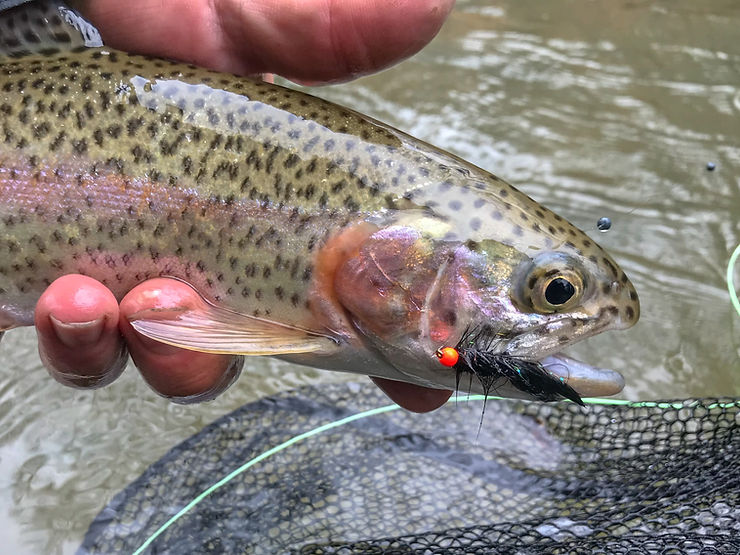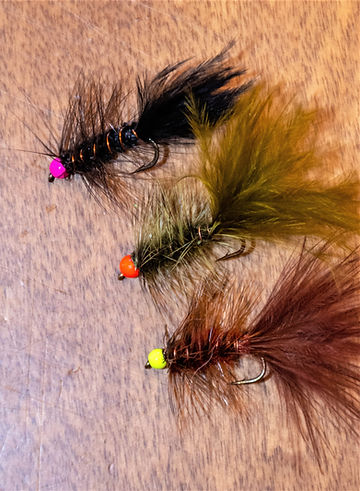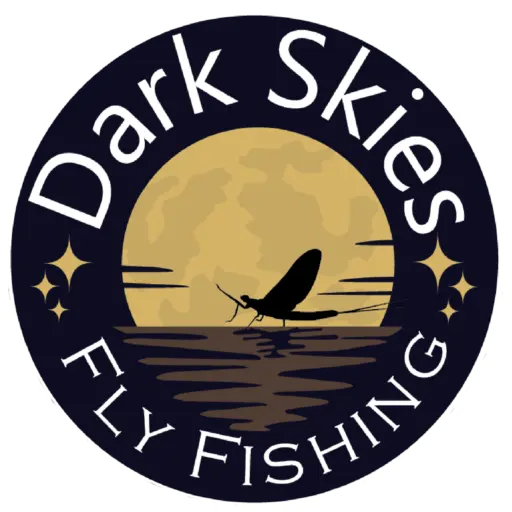In the Fly Box: Hot Head Woolly Buggers

There are so many variations of Woolly Buggers available today that sometimes it’s hard to keep track. As new materials are developed and made available to fly tyers, I have no doubt that list will continue to grow. But regardless of what new buggers might be the latest rage, one that will always be found in my fly box is the Hot Head Woolly Bugger.
Last week, a friend and I were fishing the Chest Creek DHALO in Cambria County. Water was medium level, clear but not super clear – there’s really no other way to describe it except that it looked like Chest Creek usually looks. It had been pounded by fishermen recently, too. Nests of monofilament hung in the trees. At one small pool, I counted six lures (both spinners and those rubber worms that people use a lot now) dangling from tree branches overhead and across the creek. This certainly wasn’t virgin water.
The morning started off slow. I caught a handful of trout the first couple of hours on a wide variety of patterns. I’d tie on a new pattern, catch a fish, then nothing until I changed to another fly. That’s a sign of spooky fish if I ever saw one. Anyway, my buddy and I worked over a section pretty good and then he moved off downstream. I stayed behind because I wanted to try one more trick: a Hot Head Wooly Bugger.
In a stretch of stream that had been pounded the past few days, and fished thoroughly by my buddy and I just that morning, the Hot Head produced. I picked up trout consistently over the next hour all along that stretch. When I got down to where my buddy was fishing, he asked how many I’d caught. “I don’t know,” I said. “I lost track.”
That wasn’t the first time I’ve experienced that with this fly. Once, on the Clarion River, I was struggling to figure out what the fish were taking until I tied on a size 12 black Woolly Bugger with a fluorescent pink bead. I dead-drifted the fly, and trout nailed it. That fly saved the day, and I can think of at least a half dozen other similar examples from the past couple of years when the Hot Head Woolly Bugger accounted for big numbers when nothing else worked.
Hot Heads can represent almost any insect that traditional Woolly Buggers imitate. Sculpins, stoneflies, etc. But when you tie them on smaller sizes, such as size 12, they’re an even better stonefly pattern and effectively imitate any of the species of Isonychia. Also, in streams and rivers with good hatches of Brown Drakes, Green Drakes, and other large mayflies, dead-drifting a size 12 Hot Head can be absolutely deadly when these species are active and on the verge of emerging.
There are two times when Hot Heads seem to excel. The first is when fishing heavily-pressured waters. Swinging and stripping Woolly Buggers always works, but in my experience they’re not as effective as nymphing in pressured rivers and streams, unless you can show these fish something different. That’s where the fluorescent bead comes into play. In essence, the bead is the ultimate hot spot, and it triggers strikes.
The second situation where Hot Heads do well is when water levels are low and clear and fish are skittish. Again, that bright fluorescent bead triggers strikes when regular Woolly Buggers do not. I realize this is a bit counterintuitive, and conventional wisdom might suggest something more subtle in these situations. But going with a Hot Head can save the day.
The Hot Head Woolly Bugger is really just a variation of an Egg Sucking Leech, but I like the weight of the bead as opposed to the chenille typically used in Egg Sucking Leech patterns. It can be tied with round or cone-shaped beads in brass or tungsten. My favorite is a fluorescent brass bead for its versatility – it can be swung, stripped, or even dead-drifted under an indicator.

You can mix and match colors of beads with colors of Woolly Buggers. My four favorites are as follows:
– Olive Wooly Bugger with fluorescent orange bead
– Brown Wooly Bugger with chartreuse bead
– Black Wooly Bugger with hot pink bead
– Black Wooly Bugger with fluorescent orange bead
I primarily carry this pattern in two sizes, 8 and 12. For me, this isn’t a fly I need in every size in my fly box, so having one larger size and one smaller can cover almost any situation that might call for a Hot Head Woolly Bugger.
The Hot Head Woolly Bugger isn’t a fancy pattern. It’s just a regular Woolly Bugger with a fluorescent-colored bead, after all. But in certain situations, it’s a killer.

Great article! I travel in NW PA on business but haven’t had a chance to fish and not sure where to start, but sure enjoy your stories as they make me feel like I’m on the stream in person! Thanks!
Thank you so much for reading and for your comment! I really appreciate your feedback. A great place to start would be to just go to the PA Fish Commission website and check out the trout stocking list and schedule. And then just pick out a stream and go exploring. There are so many great places to fish in this region. Best of luck!